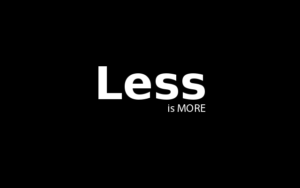If you want to be a better communicator then … whatever “they” ask you to speak about … whatever “they” expect … whatever they assign you … ignore it!
But how … but what if … but, but, but … I have to …
Let me explain.
Speaking Without Passion
Have you ever been asked to comment on a subject you found incredible uninteresting? Have you ever been assigned to report, speak, or present a mundane topic? Have you ever been nervous because you were assigned a sensitive topic or potentially embarrassing task?
For example, if you have kids, you’ve probably been invited to to your child’s classroom around about fifth grade to sit with your child through a “sexual maturation” lesson. If your experience has been anything like mine, the adults teaching those lessons are usually so afraid of how the kids (or the parents) might react that they literally waste an hour of your life by talking for an hour without actually saying anything. It’s painful!
 It doesn’t have to be that way. The problem is that those “teachers” don’t really want to give that lecture. I promise every one of those “teachers” have a “passion” or strong emotional feelings of some sort related to the subject of “sexual maturation,” but they’re not talking about THEIR passion, they’re ticking off a list of assigned topics just to get their assignment over with.
It doesn’t have to be that way. The problem is that those “teachers” don’t really want to give that lecture. I promise every one of those “teachers” have a “passion” or strong emotional feelings of some sort related to the subject of “sexual maturation,” but they’re not talking about THEIR passion, they’re ticking off a list of assigned topics just to get their assignment over with.
I spent years creating a presentation skills system, with dozens of step-by-step communication techniques. But to be honest, the single most important part of public speaking is something I can’t boil down into a step-by-step formula. But I’m going to try anyway … Here it goes …
Step 1: Ignore the Assignment
The most important ingredient in public speaking (or communication in general) is true passion and genuine enthusiasm about your message. Unfortunately, you can almost never have true passion and genuine enthusiasm about somebody else’s checklist. That’s the problem!
Authentic excitement and energy doesn’t come from completing an assignment that “they” give you. True passion, only comes from within, not from without. Therefore:
Never speak about an assigned subject!
At least at the beginning, you have to ignore the assignment. Whether you’ve been asked to give a quarterly report, asked to give a sales presentation, asked to give a eulogy, asked to call an irate client, asked to present a proposal to management, asked to teach a Sunday school class on “Jesus,” or asked to teach a “sexual maturation” seminar … step number is the same:
Step 1: Never speak about an assigned subject!
Did I just tell you to ignore “Jesus” when teaching a Sunday School class?
Yes! Yes I did! … at least for a little while.
Step 2: Talk about YOUR passion
I love trees … and you probably couldn’t care less that I love trees! But, on the other hand, you don’t really care what I think about “sexual maturation” either!

You’re essentially neutral when it comes to my musings on sexuality versus my discourses on trees. Talking about sexual maturation can be uncomfortable, but I LOVE trees!
So let me ask you this–if you had to be locked in a room and you were forced to listen to me ramble on about one subject or the other, would you prefer that I talk about trees, or sex?
I suspect the voting will be nearly unanimous. And just in case you were the exception, let me assure you–you want to hear me talk about trees!
I love trees!
All else being equal, you want to hear me talk about the subject I care most about, the subject I know must about, and the subject for which I have the most enthusiasm!
There is a reason nobody buys tickets to go to “Adele lectures on the allegory of trees.” We buy tickets to hear her do what she does best–her passion–her singing!
It doesn’t matter what topic you were assigned, step number two is the same:
Step 2: Talk about your passion
As long as you are talking about one of your passions you will be more energetic, more genuine, more authoritative, and more interesting!
In other words, you DO want to hear ME talk about the “allegory of trees!”
Step 3: Make the Connection
The last step is easy:
Step 3: Show me what your passion has to do with the assigned topic
I once had the opportunity to teach a Sunday School class at my church, and I practically begged to teach the lesson on sex. To be honest, it wasn’t a tough sell, because nobody else felt comfortable teaching the subject.
Why was I so excited to teach an awkward subject?
Because I had no intention of talking about sex — I wanted to talk about trees!
And it just so happens that trees make a wonderful metaphor for intimacy … and business … and relationships … and public speaking skills … and so on.
When you talk about something you love, I promise, it will be really easy for you to relate that passion back to the subject at hand.
I promise you can relate your passions to the quarterly report, or the sales presentation, or the eulogy, or the irate client, or the management proposal, or to “Jesus.”
The audience will notice that you gave one of the best presentations they’ve ever heard on < Insert assigned subject here >, they just won’t have any idea how you did it.
If you’ve ever been to one of my classes, you’ve probably heard me talk about trees, but you probably didn’t notice. You probably thought I was talking about public speaking techniques.
That’s the beauty of it.
You get to talk about what you love, but the audience gets to hear what they need.
You have more enthusiasm, even if the assigned subject is dull.
You convey authority on your passion, even if you’re not an authority on the assignment.
You need less preparation, yet you sound more prepared.
You sound completely genuine, because … you are!
All you have to do, is ignore the assignment.
Image source: nyphotographic.com











